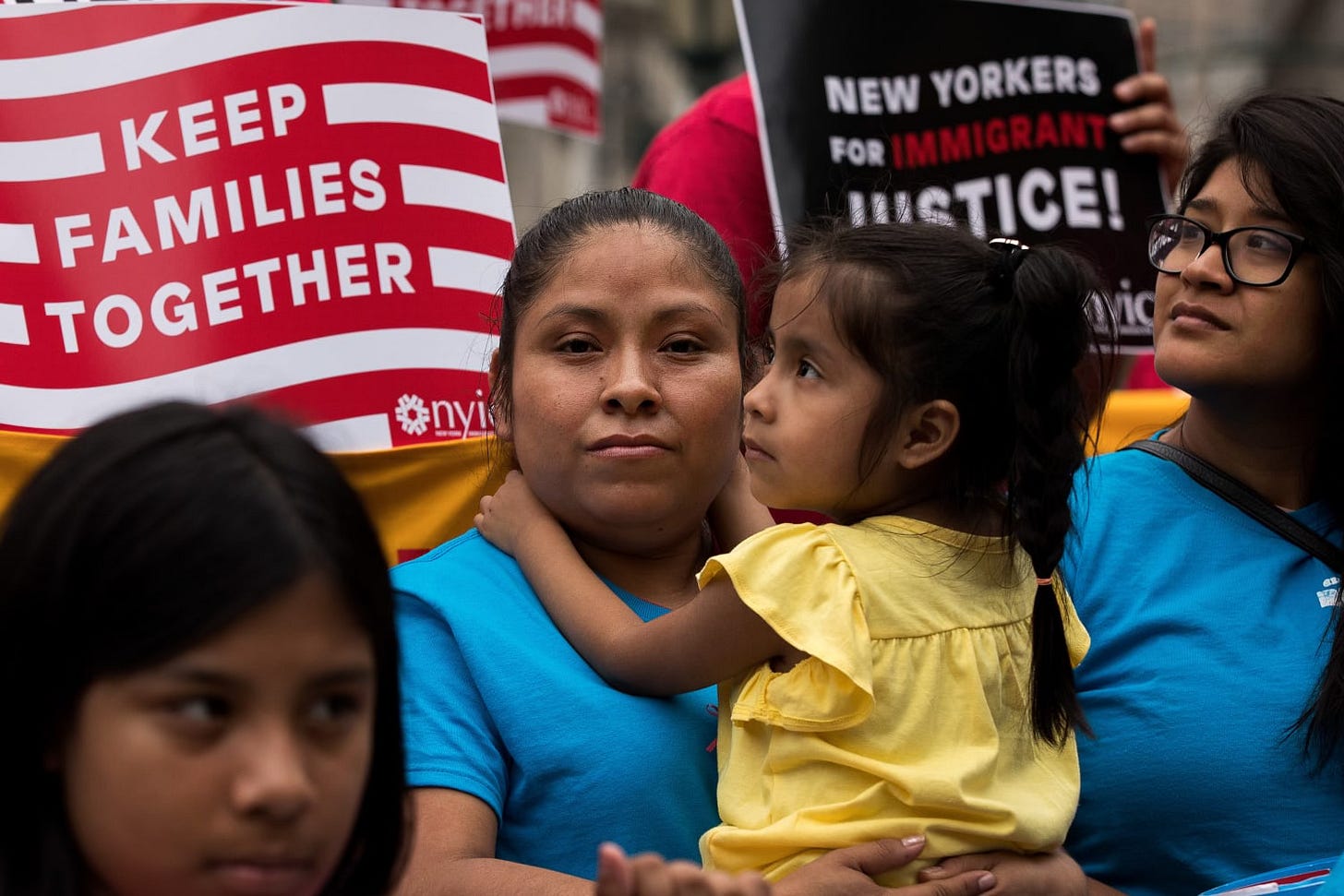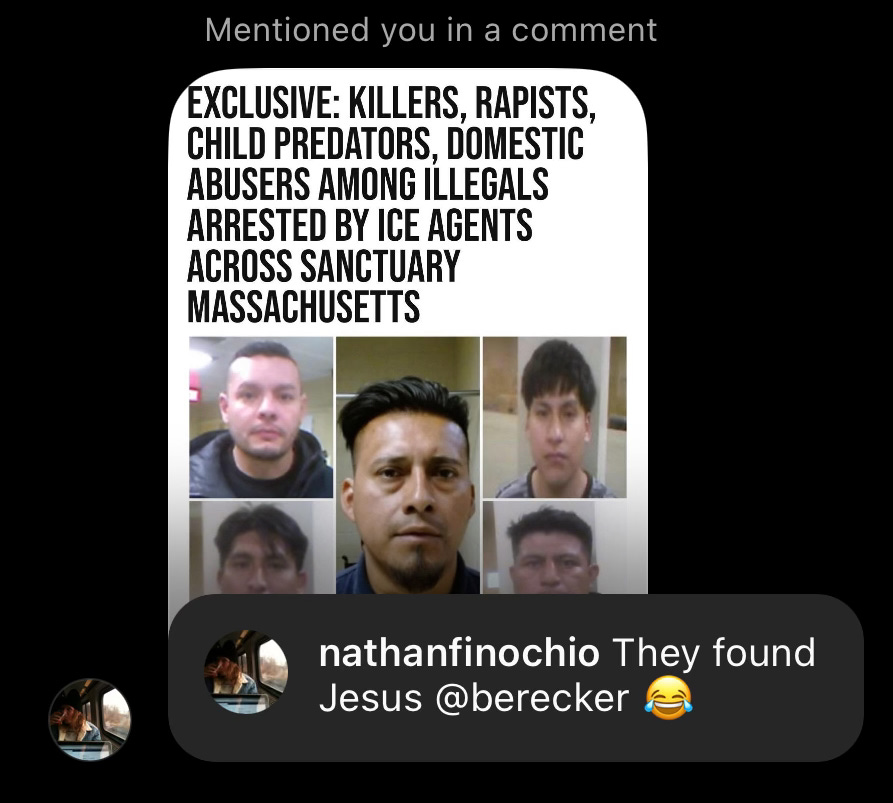When Jesus Meets ICE
Mass Deportations, My Scuffle with a Seminary President, and the Logic of Empire vs the Kingdom of God
Let me begin with some facts.
Undocumented immigrants are more likely to be part of the workforce than American citizens,1 they are less likely to be criminals,2 and they pay about $100 billion in taxes—including contributing billions to programs like Social Security and Medicare that they are excluded from.3 As a result of their massive contributions, the vast majority of economists believe that the net effect of illegal immigration on the U.S. economy is positive, not negative.4
Unlike immigration, which is good for the economy, mass deportations would be a disaster. They would be incredibly expensive and would cripple the workforce, leaving entire industries limping. The human toll would be even greater, leaving millions of families in shambles.
The cost would be immense.
So why is the Trump regime hell-bent on mass deportations?
It’s clearly not about the economy. No, it’s about something even more central to the logic of every empire: scapegoating an outsider.
In this sense, it is perfectly conventional. Facts have never guided the decisions of empire—they always run on fear, control, and the need for an enemy.
Conservative Christians often talk a big game about being countercultural—about being “not of the world.” But they frequently fall prey to the scapegoating logic of empire, the very logic the biblical narrative works to dismantle from beginning to end—and yet one that still grips the imagination of Christian nationalists. I’ll give a real-life example of that in just a moment, when I argued with a Seminary president about it. But first, we need to understand that how we respond to immigrants in our country isn’t just a policy debate—it’s a battle between the logic of empire and the kingdom of God.
God of the Vulnerable
From the very beginning, the story of God’s people is a story of outsiders—a story of immigrants.
From Abraham’s first call—“Go from your country, your people and your father’s household to the land I will show you”—God’s people have always found themselves as strangers in a strange land.
When Abraham’s descendants began to make their home in Egypt, they were quickly targeted with xenophobic resentment and nationalist fear.
Standing in a long lineage of dictator bullies who saddle a minority with the anxieties of their nation, Pharaoh told his people what they always tell their people:
“They won’t assimilate.”
“They’re not like us.”
“They’ll change our culture.”
“They don’t belong here.”
So he persecuted and enslaved them.
This is always how empire responds to shifting demographics: with dehumanization and control.
We’ve heard these same lines repeated in American history—against the Irish in the 1840s, the Italians in the early 1900s, and today against Latin, African, and Middle Eastern migrants. They’re called invaders, freeloaders, a threat to the economy or our “culture.”
Empire always needs an “other.” The cast changes, but the fear stays the same.
When God delivers the Israelites from Egypt, they become a refugee people. This refugee story becomes central to their self-conception and to their conception of their neighbors:
“When an alien resides with you in your land, you shall not oppress the alien. The alien who resides with you shall be to you as the citizen among you; you shall love the alien as yourself, for you were aliens in the land of Egypt.”
Leviticus 19:33–34
This wasn’t an ethical side note. It was their foundational identity. The Israelites were to remember their own suffering and vulnerability—and let it soften them to the vulnerable of the world.
They were never supposed to accept the way of Pharaoh—the way of “insiders” and “outsiders.” Instead, God’s people were to “love the alien as yourself.” This is a new way of being in the world that defies conventional wisdom.
Many scholars argue the Exodus narrative is not historical in a modern sense but mythological in the best sense—a chosen, sacred origin story. If that’s true, it means God’s people intentionally wrote their own history to begin not with power but with displacement. Not with conquest, but with vulnerability. What kind of people do that, unless they believe it forms them for compassion?
The Upside-Down Kingdom
The message of Jesus was the Kingdom of God, which was a direct confrontation to the kingdom of Caesar—and to the logic of every empire. Jesus’ kingdom ran on a totally different operating system, one that rejected the hierarchies of control and domination.
Theologians call it the “upside-down kingdom” because instead of scapegoating the vulnerable, Jesus centered them:
Blessed are the poor.
The last shall be first.
Woe to you who are rich.
The humble will be exalted.
Early Christians saw themselves not as citizens of empire but as “strangers,” “aliens,” and “exiles.” They belonged to God’s new world, not Caesar’s old world.
“Our citizenship is in heaven,” the apostle Paul wrote (Philippians 3:20).
Don’t get it twisted—a heavenly citizenship does not remove us from the world; it unites us to the vulnerable of the world. It means that Rome did not define who belonged—God defines who belongs. It means that there is a deeper allegiance than that of race, culture, nation, or even religion. All these are tools the empire will gladly use to divide us up and stratify us into hierarchies—but we must reject the whole “dirty rotten system,” as Dorothy Day called it.
Citizenship in the kingdom is a new way of seeing the world and everyone in it.
We are bound up together in God with a belonging that crosses every border and culture. Our heavenly citizenship rejects the binary logic of empire that creates “us vs. them,” “legal vs. illegal,” “citizen vs. alien.”
In God’s economy, there is no “them,” only us.
Jesus told stories to help his followers reimagine a new kind of world. Stories like the great banquet, where the rich refuse to join the party, so God invites in the crippled, the poor, the beggars.
Stories like the Good Samaritan, where the “other” becomes the savior.
In these stories we hear the echo of God’s command to the Israelites:
“You shall love the alien as yourself, for you were aliens in the land of Egypt.”
When we see ourselves in the alien and the alien in ourselves, we have begun to love like Jesus.
We have begun to shake off the chains of the empire’s logic of separation.
Then Jesus pushes us even further in Matthew 25:
“I was hungry and you gave me no food, I was thirsty and you gave me nothing to drink, I was a stranger and you did not welcome me... Just as you did not do it to the least of these, you did not do it to me.”
Matthew 25:42–45
Jesus says, don’t just love the alien as yourself.
Love the alien as me.
As Christ.
In the kingdom, every vulnerable person becomes as Christ to us.
The only way to truly defeat the cruel logic of empire is to see that every person the system tells you is expendable—and in the American empire there are millions and millions of people we are told to believe are expendable—is, in reality, a divine image bearer of infinite worth, fully worthy of the name Christ.
Do we believe this?
Many who call themselves Christians refuse to embrace the logic of the kingdom.
Here is one example.
A Case Study in Empire vs. Kingdom Logic: My Disagreement with a “Seminary” President
I recently quoted this beautiful passage in Matthew 25 as a reason Christians should welcome immigrants:
“I was a stranger and you did not welcome me.”
I echoed Jesus’ clear point: that to welcome the stranger is to welcome Christ.
Nathan Finocchio, president of TheosU—a unaccredited, hyper-conservative online seminary—responded (check the comment thread here) by saying this passage only applies to persecuted Christian missionaries. According to Nathan, this profound demand from Jesus about welcoming the least of these has no application for today’s immigration conversation! Or anything to do with how we treat today’s vulnerable migrants!
A convenient interpretation for a Nationalist.
I challenged his interpretation, pointing out that Jesus is talking about a judgment on “the nations,” meaning this passage has universal application—it’s about the kinds of communities we are creating.
Even if this passage were only applicable to other Christians, over 80% of immigrants to the U.S. identify as Christians. Many are more faithful and churchgoing than their American counterparts. Many are literally fleeing persecution.
But I don’t believe Jesus ever narrowed the scope of mercy to only Christians—in fact, Jesus constantly blurred the boundaries of who “belongs” in the family of God—making enemies into neighbors and strangers into kin.
So no—I do not believe Jesus wanted us to limit our welcome to our tribe only. Jesus is underscoring the logic of the kingdom of God: in God’s kingdom, every person—especially the last, least, and littlest ones—is treated with all the dignity of Christ himself. This is the way of love that tears the empire down.
Nathan believed this to be ridiculous.
He fired back with snark, tagging me in a series of posts highlighting horrible crimes committed by immigrants.
One Breitbart headline he shared read:
“EXCLUSIVE: KILLERS, RAPISTS, CHILD PREDATORS, DOMESTIC ABUSERS AMONG ILLEGALS ARRESTED BY ICE AGENTS”
Nathan commented below, "They found Jesus. 😂”
He was mocking me. Because to him, the idea that Jesus could be found among the imprisoned—or the undocumented—is comical. Absurd.
I also found this absurd—absurd that a seminary president, even an online unaccredited one, is drinking from a firehose of xenophobic propaganda.
But I have to give it to him—it is absurd to think that one could encounter Jesus Christ in a prison cell with a killer or a rapist. The way of the kingdom of God is absurd indeed to the conventional logic that runs the world.
I asked Nathan, and I remain curious—what is the point of his spirituality?
If Christianity is a tool to say some people are “in” and some people are “out”—well, I don’t need Christianity for that. That’s empire logic as old as Pharaoh himself. I don’t need to be struck by grace to think conventionally. I can scoff at people just fine on my own.
My ego is wonderfully adept at dividing people up, writing people off, placing people into categories of “worthwhile” and “disposable.”
But Jesus doesn’t let me do that. Jesus was never shrinking the circle of grace, but always widening the scope of mercy. May I never scoff like Nathan, or think that I couldn’t possibly find Jesus in a prison cell with a killer.
The reason I need grace—and the reason this passage in Matthew 25 is so close to my heart—is that I do not naturally see Christ in the poor, the sick, the imprisoned, and the stranger.
But what if it’s true that this is precisely where Christ dwells?
What if coming to see Jesus—the image of God, the stamp of the divine, the presence of Christ—in every single person, especially where I am most likely to refuse to see it—what if this is the way we all get free?
If the church truly wants to follow Jesus, it must reject the way of Pharaoh, Caesar, Trump, and every other tyrant building an empire of fear, control, and exclusion.
We must remember our identity—citizens of heaven. Exiles. Strangers.
“You shall love the alien as yourself, for you were once aliens…”
And may we still find Christ among the aliens.
If this resonates with you, my book Hell Bent dives deeper into how we can reclaim a faith rooted not in fear or exclusion, but in healing and radical love. Hell Bent is a journey out of punishment-based religion and into a spirituality that honors your body, your questions, and your belonging. Pre-order now!









Very well said. Thank you for taking the time to articulate this without spewing hate on others - yet still taking a stand.
I've been waiting for this. Thank you. I appreciate your words after a week of watching people I had respected fall prey to fear and propaganda. Their words and calls for harm against protesters are so disconnected from God, yet they'll lead the prayer at dinner this weekend. I'm tired and praying for my own courage to speak up.